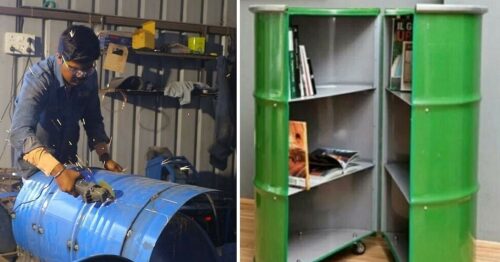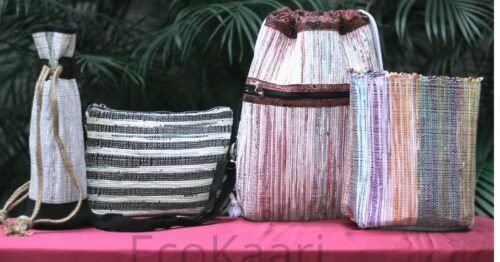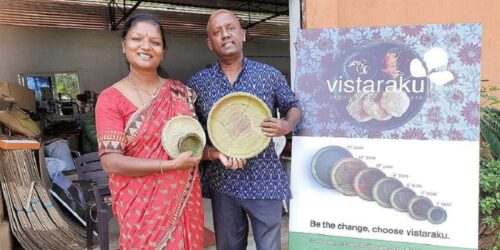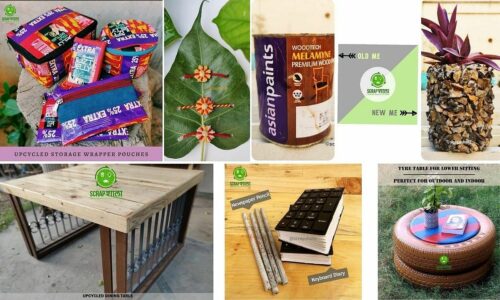Many have raised the concern that the waste management problem in India is mounting phenomenally, and rightly so. As much as 94 percent of the total waste collected in the country is dumped into landfills, left to pollute the environment. While some of this garbage is degradable, a large portion consists of materials like plastics, metals, and other substances which take hundreds and thousands of years to decompose.
But a simple fact sets this magnanimous problem in perspective: the less you dump, the less will collect.
Garbage disposal is a major travesty that is often considered irreplaceable owing to its scale. One may contest that eliminating the use of certain products and materials is impossible in daily life, thereby making its disposal after fulfillment inevitable.
While that is true, there is a solution. What if we told you that you can not only lessen the amount of waste that hits the dustbin, but can also generate a source of income out of it?
While many conscious citizens have begun responsible waste disposal at a personal level, some driven start-ups are igniting the spark for sustainable business on a larger scale. These are businesses that upcycle and recycle redundant objects to create commercially viable products.
The Better India shares five such sustainable business ideas which you can begin yourself to upscale waste management while profiting from it:
1. Upcycled Furniture
The fact that furniture is used in every household makes it a great avenue for upcycling waste. To reuse large quantities of waste materials, one can build products like chairs, tables, cupboards and more which are always in demand.
Pradeep Jadhav of Pune, for instance, started Gigantiques Furniture to create practical furniture models out of materials like used tyres and barrels. His career trajectory of having fulfilled over 500 orders confirms the growing ubiquity of such products.

He said that the business requires a small seed investment, but has the potential to pick up and pay back in profits. One should look out for the cheapest sourcing options for the raw material and have a clear idea of what it can be fashioned into for best utility.
2. Recycled Products
Despite its cons, plastic offers great utility. This is why it flows into every Indian household in the form of carry bags, packaging, and storage containers.
The simplest way to begin a prudent business is to use this plastic to recycle into reusable products.
Mumbaikar Rita Maker is a fine example of such pragmatic action. She cuts strips of polythene bags and crochets them into mats, bags, and other products. “In 2016, I saw a video on Facebook in which a woman was making a mat out of Walmart shopping bags. That’s where I got the idea. I know how to crochet, so I collected all the polythene and plastic bags in the house and got to work,” she said.
Another inspiring idea reveals itself in Nandan Bhat’s brand Ecokaari. This Pune based start-up is minimising the amount of plastic bags, gift wrappers, and bags of pulses and flours that reach the landfill. Collecting all material from sources like local garbage collectors, Nandan takes them to a unit where they are washed and dried. The artisans employed under his brand cut this plastic into small strips and weave them into a fabric that is made into products.
He said, “We have options ranging from pouches, purses, hand bags, travel bags to electronic covers, which people can buy as per need.”

3. Upcycled Decoration
Delhi-based Siddhant Kumar teaches us how one can begin a waste upcycling start-up with minimal investment. This IIT Bombay alumnus is running Denim Decor, a brand that refurbishes old decoration and utility items like lanterns and pen holders, among others, using denim clothing.
At the other end of town is 33-year-old Meenakshi Sharma who calls herself an upcycling artist. Her efforts reuse 200 kg of old clothes a month to make carpets, rugs, bags, and other products.
4. Eco-Friendly Crockery
The use of environment-friendly cutlery and crockery has been gaining fast momentum in the country. Madhavi and Venugopal of Hyderabad have capitalised on this trend to promote an eco-friendly lifestyle choice.
Their brand, Vistaraku, offers an alternative to styrofoam tableware in their products made of palash leaves.

Quitting the worn out path of corporate careers, the couple began organic farming on a patch of land, where they now grow the said trees as well.
Venugopal says that with increasing awareness, the demand for sustainable products has been increasing as well.
5. Upcycled Home Decor
Dumped garbage can be transformed into beautiful decoration items, and you’d never be able to tell that it was once just waste. Beginning a small home decor business, one can reuse things like old plastic bottles, utensils, clothes, and more to make lamp shades, wall hangings, book covers and more.
A great example of this are the planters that Shikha Shah of Varanasi makes out of old plastic containers. She also uses electronic waste like hardware items that have fallen out of use to make out of the box stationery items like pen holders.

What started as a venture to collect and paint glass bottles began getting her enough orders to expand her product range.
Her advice for some who wishes to explore sustainable entrepreneurship was:
- Be creative and open to learning something new.
- Get people’s feedback to find out what they need. Build products that fill that market gap.
- Ensure that your products have a good quality about them.
- Use social media to market your business.
Edited by Divya Sethu
No comments:
Post a Comment